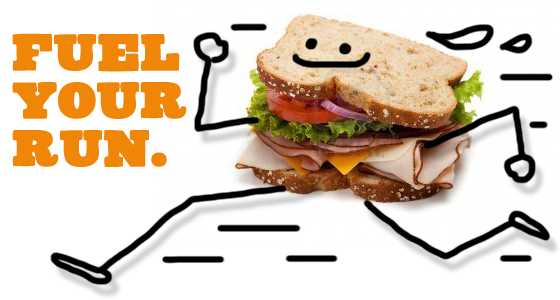
Runners plan out the running schedules, track mileage, monitor heart rate and pace, and pay precise attention to when it’s time to replace sneakers. But nutrition, especially what to eat before and after a long run, often is hit-or-miss at best.
Imagine your body as a high-performance sports car. We can’t expect to drive far or fast using low quality gasoline, and we all know what happens when we run out of gas. Give your body high quality nutrition at the right times, and you’ll feel great, run longer, and recover quicker.
Fuel before a run for optimum energy
Your body runs on carbohydrate, and topping off your tank before a run with quickly digesting carbohydrate gives your body the energy it craves. This is not the time for high fiber, slowly digesting foods like whole grain breads or cereals or legumes. Also avoid foods high in fat, since fat takes a long time to digest and could lead to nausea or cramping during your run. Small amounts of protein are fine, but it’s the carbohydrate in this pre-run meal that fuels your muscles. 1-2 hours before you run, eat 200-300 calories of fruit, vegetables, grains, milk or yogurt. Drink 1-2 cups of water or sports drink along with the snack to start your run fully hydrated. Be sure to experiment with pre-run snacks during training to avoid any race day surprises.
Examples of pre-run snacks:
6-8 ounces of yogurt with one piece of fruit
1 mini bagel with a smear of peanut butter
1 cup lower fiber cereal such as Rice Chex or Cheerios
Turkey sandwich
Baked potato or sweet potato sprinkled with a small amount of shredded cheese
Refuel after a run for optimum recovery
The American College of Sports Medicine recommends eating within 30 minutes after finishing a long run to replenish glycogen (stored carbohydrate) you used during your run, repair damaged muscles, and replace fluids and electrolytes lost in sweat. If you don’t replace glycogen after each run, your muscle glycogen stores drop too low and your legs will feel tired and heavy even at the beginning of a run. The best way to refuel is with a combination of carbohydrate and protein. Aim for 50-100 grams of carbohydrate and 10-20 grams of protein to start the recovery process. Continue eating 50-100 grams of carbohydrate and 10-20 grams of protein every two hours until your next meal to fully repair muscles and fill up your glycogen tank. If eating right after finishing a run doesn’t agree with your stomach, drink chocolate milk. A large body of research shows that the carbohydrate and protein in low-fat chocolate milk optimally promotes muscle recovery.
Examples of post-run snacks:
16 ounces low-fat chocolate milk
Turkey sandwich, 8 ounces milk, and a piece of fruit
Rice bowl with beans, cheese, lettuce, tomato and salsa
Peanut butter and banana sandwich and 8 ounces of milk
Lynn Grieger is an Everyday Health contributor, American College of Sports Medicine certified personal trainer and a Road Runners Club of America certified running coach who has completed over 30 marathons.
Have something to say? Leave a Comment